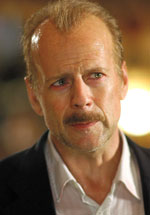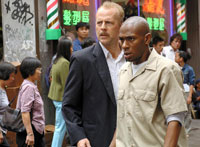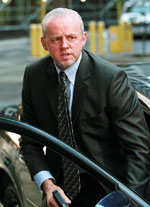Bruce Willis is one of our more unpredictable leading men, and bless him for it. At times he’s a guns-blazing action hero, at other times he’s a world-weary serious actor, and then there are those times when he’s a would-be funny-man who’s a little too heavy on the smirk. The variety of his output extends to his choice of projects, which range from preordained blockbusters to small, risky independent flicks, with more conventional genre pics in-between. This unpredictability can give his films a certain suspense, apart from their content; you never entirely know whether the film he has picked will be worth his time and ours, and for every praiseworthy The Sixth Sense, there is a disappointing Hostage.

At first glance, 16 Blocks might look like one of his lesser efforts. It’s a potboiler in which Willis plays an aging New York City detective named Jack Mosley who reluctantly agrees to take a witness named Eddie Bunker (Mos Def) from the police station to the courthouse, but then discovers that a number of dirty cops—including his former partner—are determined to prevent the witness from getting there. Like the title says, there are only 16 blocks between the station and the courthouse, and Mosley has nearly two hours to get his witness there; but the streets and alleys are swarming with obstacles, and you can easily imagine screenwriter Richard Wenk (writer-director of Just the Ticket) sitting at his desk and brainstorming ways to drag the chase out to the very last minute, while throwing in the occasional escape hatch for our protagonists. As the story unfolds, each plot twist feels like the sort of thing that would happen only in a movie, because that’s exactly what it is.
However, just as it can be fun to watch a talented musician fiddle with an old standard, it can be entertaining to watch talented actors settle into a familiar mode of storytelling. Willis does fire his gun a fair bit, but his character this time is less an action hero and more of a jaded, grizzled cynic who gives the impression that he can’t wait to die; he drinks too much and walks around with a bad leg, and at one point he declares, “Life is too long.” However, something stirs in Mosley’s soul when he and Bunker are thrown off-course by a couple of hit men, and a handful of his colleagues show up to take the witness off his hands—by framing the witness and planning his death. You can sense that Mosley is used to looking the other way when his friends do something wrong, but this time, he stands up to them—and it may be that no one is as shocked by this turn of events as Mosley himself.

The scene is made all the more interesting because the leader of the dirty cops and Mosley’s ex-partner, Frank Nugent, is played by Willis’s Twelve Monkeys co-star David Morse, who plays his character not as an outright villain, but as a genuinely personable kind of guy who has, unfortunately, convinced himself that certain evil deeds can and must be committed. There is genuine humor, and even a hint of warmth, in moments like the one where, in a pause between shoot-outs, Nugent tells Mosley that he was aiming for Bunker, “if that makes you feel better.” Lines like that also keep you guessing: does Nugent truly still feel some sort of affection for his former partner, or is he only saying so to make Mosley surrender, after which he might exact some sort of revenge against him? Thanks to Morse’s subtle, even ambiguous, interpretation of the character, it’s impossible to say for sure.
That’s just one of many admirable things about 16 Blocks. Another is the film’s reluctance to indulge in the sort of vengeful bloodletting that is so common to stories of this sort, partly because Mosley is too aware of his own spiritual sickness to claim the moral high ground. Yes, he shoots a few people, but he almost always aims to wound, not kill, and where possible, he takes his former colleagues out of the equation merely by handcuffing them to a post or wall; this is not the sort of action movie where we measure how close we are to the end by the number of villains who are still alive. This restraint is all the more admirable because the film is directed by Richard Donner, who helmed all four Lethal Weapons.

What’s also striking about the movie is the relationship between Mosley and Bunker, whose non-stop talkativeness is annoying at first, but it does open up opportunities for the two men to discuss their different takes on life. Bunker is a career criminal who wants to change his ways—and open a bakery, of all things—whereas Mosley doesn’t believe that people can change. But the longer Mosley sticks his neck out for Bunker, the more we see that Mosley really is changing in small but significant ways. What’s more, Bunker sees “signs” in everything, and while none are particularly magnificent—and a few, like the old man who opens a door for them while explicitly saying he never opens his door, could be written off as screenwriting devices—they do add just a hint of Providence to the proceedings.
Admittedly, the movie does fall back on some tired old tropes, some of which—like when Mosley takes a bus hostage—feel like they could have been entire movies unto themselves, rather than brief and possibly underdeveloped episodes lasting only several minutes. The story has been cobbled together from familiar elements; however, it does manage to arrange these elements in ways that are occasionally surprising, and in ways that accord quite nicely with Christian ideas about sin, repentance and redemption. Indeed, late in the story there is even an explicit, if non-religious, reference to salvation. At one point, Mosley tells Bunker that he’s not a good man—and this is true. But in its own modest way, 16 Blocks affirms that goodness is something that even bad men can, and should, aspire to.
Talk About It
Discussion starters- Jack Mosley says he is “not a good guy.” Do you agree? Is anybody in this story “good”? If they are not “good” at first, do they become “good” by the end? How does this fit with biblical ideas about sin and repentance?
- Fairly early on—but after he has turned against his colleagues—Mosley says, “Days change, seasons change, people don’t change.” Why do you think he says this, at this point in the story? Has he “changed” already? Does he still need to “change” some more?
- When Mosley says the dirty cops have crossed the line, Nugent replies, “There’s no lines! There’s getting it done and not getting it done.” Do you think Mosley has crossed any lines? Why do you think he put his foot down at this particular line? Can you go back, after you’ve crossed a line?
- Do you look for “signs” in the world, like Bunker does? How do you look for them? What do you think a “sign” is? Note the scene where one person says to another, “I was supposed to meet you. That was the sign. You saved my life.” Is the salvation he’s referring to spiritual, physical, or a bit of both? Do you think statements like these point to God in any way? Is redemption possible without God in the picture?
The Family Corner
For parents to consider16 Blocks is rated PG-13 for violence, intense sequences of action, and some strong language, including about half-a-dozen four-letter words. The violence is relatively restrained—especially from the director who brought us the bloody Lethal Weapon films.
Photos © Copyright Warner Brothers
Copyright © 2006 Christianity Today. Click for reprint information.
What Other Critics Are Saying
compiled by Jeffrey Overstreetfrom Film Forum, 03/09/06In 16 Blocks, Bruce Willis is a burned-out cop who accepts a simple assignment—transport a prisoner from Point A to Point B—and discovers that this will be the toughest job of his career. Mos Def plays the crook, who happens to know something valuable to a court case, and whose life is in jeopardy while he’s out in the open. When the cop realizes that his colleagues want to kill this man so they can protect the reputation of some crooked officers, he springs into action in order to make sure justice is done.
At first glance, it appears to be just a run-of-the-mill action thriller. And Richard Donner’s recent films haven’t been cause for celebration. But in his better days, Donner provided us with compelling entertainment like Superman, Lethal Weapon, and Ladyhawke.
Is 16 Blocks just another action movie? Or is it a return to Donner’s strengths?
Harry Forbes (Catholic News Service) says it’s the best of the recent films about “dirty cops.” He praises “the winning teamwork of stars Bruce Willis and Mos Def. In their accomplished hands, 16 Blocks … still remains wildly far-fetched, but if you’re willing to suspend disbelief, it’s surprisingly diverting.”
Marcus Yoars (Plugged In) calls it “a surprisingly intelligent film that, unlike most of its genre contemporaries—especially the standard Willis project—relies more on situational intensity than fast-paced action and loud explosions.” He is surprised by the theme of redemption, but says the film is tainted by “just enough garbage to make it difficult (or impossible) for discerning moviegoers to get from point A to point B.”
Willis is winning some admiring reviews in the mainstream press.











